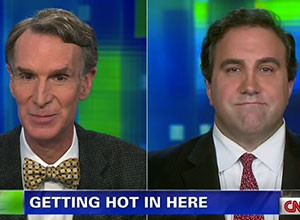 It’s well known that documentaries generally have a smaller audience than fiction films, and it’s become a tried and true piece of wisdom for non-fiction filmmakers that they need to find an entertaining way to hook the viewers in, to get them interested. In his latest film, Merchants of Doubt, Robert Kenner cleverly manages this by starting us out with an illusionist, Jamy Ian Swiss. Swiss is a smart and engaging performer, and as we watch him do card tricks in front of a small audience, he explains that in his profession it’s understood that what he’s doing is a trick, not real—and this he considers ethically superior to the vast array of unscrupulous con men who feed us false conclusions in order to gain an advantage. In this regard, he uses the three-card monte street hustle as a good example. The reason people fall for it is that the con man has an accomplice pretending to be a stranger, a shill in the audience who bets and wins, thereby persuading the mark that he is able to win as well.
It’s well known that documentaries generally have a smaller audience than fiction films, and it’s become a tried and true piece of wisdom for non-fiction filmmakers that they need to find an entertaining way to hook the viewers in, to get them interested. In his latest film, Merchants of Doubt, Robert Kenner cleverly manages this by starting us out with an illusionist, Jamy Ian Swiss. Swiss is a smart and engaging performer, and as we watch him do card tricks in front of a small audience, he explains that in his profession it’s understood that what he’s doing is a trick, not real—and this he considers ethically superior to the vast array of unscrupulous con men who feed us false conclusions in order to gain an advantage. In this regard, he uses the three-card monte street hustle as a good example. The reason people fall for it is that the con man has an accomplice pretending to be a stranger, a shill in the audience who bets and wins, thereby persuading the mark that he is able to win as well.
Kenner’s real subject, of course, is not magic. His last feature film was the very impressive Food, Inc. from 2008, exposing the negative influence of the corporate farming and food industry. Here he tackles another big subject, one never explicitly covered in a film before, as far as I know: the so-called “experts” who show up in the media to argue against scientific research that exposes dangers from corporate products—especially the current wave of climate change denial emanating from the coal and gas industries.
We start with cigarettes, the film showing us clips from years of arguments by tobacco company spokesmen and their surrogates that smoking is not harmful, or that the evidence is inconclusive. Leaked internal documents from these companies revealed that they knew as far back as the early 60s that smoking was harmful, and then they went to work fighting against and delaying any government action. The huge amounts of money at stake obviated any sense of the public good. Another example that turns out to be related: the flame retardant material in furniture. We were told that it was the furniture’s fault that so many building fires occurred, not the fact that smokers didn’t put out their cigarettes. It took years for investigators to prove that not only was the flame retardant ineffective, but it was a health hazard. Meanwhile, some of the same experts, paid by front groups, went to the media and the courts to help industry keep putting the stuff in your couches.
As we move on to global warming and climate change, the film exposes some astounding facts. A survey of all published papers by climate scientists, for instance, designed to see how many disagree that man-made climate change is occurring, comes up with the number zero. The woman who made this study was then attacked. That’s one of the techniques, to smear the scientists’ reputation. Then we find some of the same people who were fighting for tobacco now reappearing as so-called climate skeptics. Kenner goes through all the various tactics, the vagaries and outright falsehoods, designed to create doubt in the public mind about something of which the climate science community has no doubt. The film scores a real coup by interviewing at length Marc Morano, a prominent denier who is very frank, indeed rather cocky, about his skills in pushing the anti-climate science narrative, even going so far as to defend the many instances of death threats and hate mail sent to scientists as fair tactics, and “refreshing.”
There is much more to be learned from Merchants of Doubt that I don’t have time to mention. It’s a powerful indictment of the way modern media practice gives an advantage to unscrupulous corporate interests who are willing to endanger all of us for the sake of profit. See it, and learn to spot the sleight of hand.

